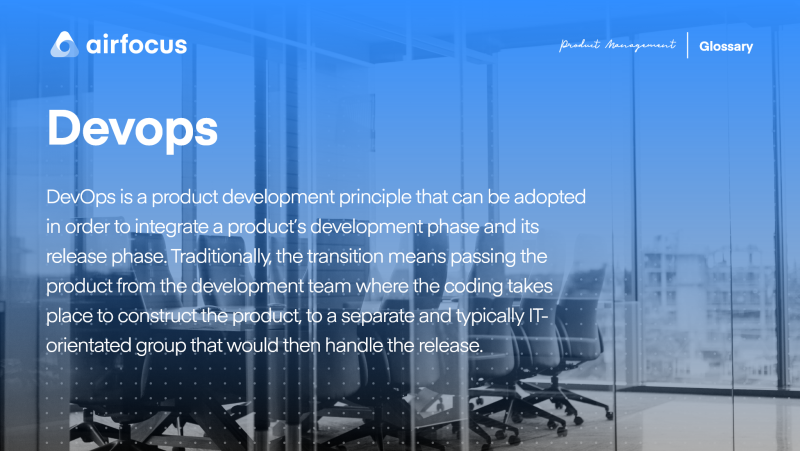DevOps
What is DevOps?
Definition of DevOps
DevOps is a product development principle that can be adopted in order to integrate a product’s development phase and its release phase. Traditionally, the transition means passing the product from the development team where the coding takes place to construct the product, to a separate and typically IT-orientated group that would then handle the release. Normally, these two groups within the business would be distinct from one another. The product is ‘handed over’ from one group to the next and can result in a knotty and problematic process. The introduction of the DevOps principle tries to provide a solution to this by merging the distinctly separate groups so as to integrate the development and release phases into a single ongoing and dynamic process.
DevOps is a modern principle that suits the pace and volatility of the contemporary software development industry. A product developed using DevOps can be brought to market faster and is able to constantly adapt to shifting market pressures.
It is worth noting that switching to a DevOps method can be disruptive to a workforce as staff may be conditioned to working in a traditional way. What with DevOps being more a mindset than a process per se, personnel would have to change their mentality toward the product, and even each other, as communication and collaboration is increased. It may even be necessary to relocate staff to facilitate these ideas. Some resistance to the changes is, perhaps, to be expected. Creating a willingness within the workforce to change, and how the leadership team encourages that adjustment, is essential. Wholesale organizational investment in the DevOps approach is important in mobilizing staff mentally. Adopting a DevOps approach to product development is more about evolving the business culture than it is about using a different toolset.
Why use DevOps?
The DevOps principle sits naturally within the agile software development mindset, where product genesis and expansion is more flexible and speedy, and also incorporates feedback to constantly mold the product. Primarily, and in this way, the product reaches finality and gets to the marketplace sooner.
By merging the groups responsible for the two phases of the product development, the collaboration that results is symbiotic. Communication is immediately improved so that knowledge and expertise can more readily flow back and forth. More minds are brought to bear when problem-solving is needed. This is a live and ongoing process and as result issues that would have normally emerged later in the product development cycle can be dealt with as they appear.
Other beneficial side effects are enhanced transparency and visibility across roles in the team. This allows for clearer demarcation of responsibilities and ownership which is an advantage for management when allocating projects to groups and individuals. In turn, individuals or groups who would have operated separately in the original traditional setup, will, in DevOps, interact more dynamically. They will be able to provide rolling feedback to one another to continuously improve the product’s development.
Product development in software design has undergone sweeping changes in the modern era. Applications especially can remain in live development indefinitely with beta testing phases lasting longer. Consequently, a culture of continued revision and release has sprung up. Endlessly revisiting and updating aspects of the product means the boundaries between the phases of development and release have become increasingly blurred. The integration of the teams involved in each of the phases has become almost inevitable, and the creation of the DevOps framework of principles that supports this type of restructuring is essential.
The foundations of DevOps
The concept of DevOps attempts to evolve the mindset of the workforce away from shunting problems further down the development process where they may be harder to resolve. Consequently, a more unified business is created, working in isolation or silos reduced, and an increased culture of collaboration promoted.
Downtime Lessening the amount of downtime is vital to a business. Regarding testing and operations, in particular, DevOps identifies errors earlier in the development cycle. They can then be confronted and ironed out before they reach quality assurance processes. Should the error come to light at that later stage, it can prove more difficult and more costly to resolve. Hindrances and downtime are then more likely as solutions need to be found and implemented. In turn, delays occur and the time taken to get the product to the marketplace is lengthened. Furthermore, resultant downtime will impact schedules and deadlines. This can lead to the need to make compromises and the final product impacted upon.
Automation DevOps also seeks to bring a high degree of automation to the development and release of the product. The main benefit is to shorten the amount of time it takes to get the product into the marketplace but has the added advantage of raising the overall quality of the product too. Automation removes manual processes from the project and therefore reduces mistakes that might otherwise creep in.
Live data Ultimately, a successful product is one that solves a problem for the consumer or even creates a solution to a problem the consumer had not realized existed. To achieve this, the product must remain as consumer-orientated as possible, regardless of where it might be in its development cycle. The way to do this is to continually collect and incorporate live data into the development process from consumers such as potential customers, potential users, or early adopters. The DevOps principle fosters a culture and puts in place tools to accomplish this. Timely analysis and integration of such information, especially before product testing, has become indispensable in the modern software development environment.
Understanding DevOps principles also enable the workforce to have a greater understanding of the project objectives. By enhancing communication and therefore collaboration, members of staff will have a better grasp of the needs and desires of the upstream and downstream stakeholders of the product. Understanding this will support their own work and result in a better product.
![What is DevOps?]()
General FAQ

Glossary categories
Experience the new way of doing product management

Experience the new way of doing product management









